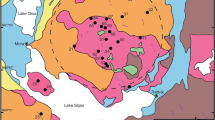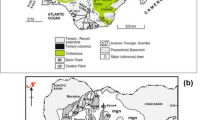Abstract
ZIRCON (ZrSiO4) is generally regarded as the most refractory accessory mineral present in the common rock types1. According to Poldervaart2, incipient granulation and recrystallization of zircon when exposed to ultra-metamorphic processes can be expected only in a stage as high as the sillimanite grade. Investigations in quartzite xenoliths in the southern norite belt of the Bushveld Igneous Complex of the Transvaal (South Africa), however, indicate definitely that these processes can be caused by usual contact metamorphism and that the foregoing conceptions should be revised.
This is a preview of subscription content, access via your institution
Access options
Subscribe to this journal
Receive 51 print issues and online access
$199.00 per year
only $3.90 per issue
Buy this article
- Purchase on Springer Link
- Instant access to full article PDF
Prices may be subject to local taxes which are calculated during checkout
Similar content being viewed by others
References
Harker, A., Metamorphism, second ed. (London, 1939).
Poldervaart, A., Nature, 165, 574 (1950).
Poldervaart, A., and Eckelmann, F. D., Bull. Geol. Soc. Amer., 66, 947 (1955).
Hoppe, G., Geologie, 6, 289 (1957).
Van Biljon, S., Trans. Geol. Soc. S. Afr., 52, 1 (1949).
Author information
Authors and Affiliations
Rights and permissions
About this article
Cite this article
SCHIDLOWSKI, M. Recrystallization of Zircon as an Indication of Contact Metamorphism. Nature 197, 68–69 (1963). https://doi.org/10.1038/197068b0
Issue Date:
DOI: https://doi.org/10.1038/197068b0
This article is cited by
-
Metamictization and U-PB isotopic discordance in single zircons: a combined Raman microprobe and SHRIMP ion probe study
Mineralogy and Petrology (1998)
-
Age and origin of detrital zircons from the pre-Permian basements of the Bohemian Massif and the Alps
Contributions to Mineralogy and Petrology (1973)
Comments
By submitting a comment you agree to abide by our Terms and Community Guidelines. If you find something abusive or that does not comply with our terms or guidelines please flag it as inappropriate.



